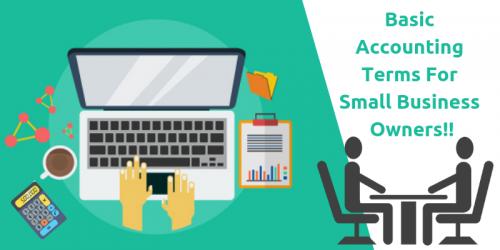Basic Accounting Terms For Small Business Owners
 Small business owners are normally not so wise to handle accounting and bookkeeping tasks. But, it is a must for them to become familiar with some basic accounting terms to avoid future losses.
Small business owners are normally not so wise to handle accounting and bookkeeping tasks. But, it is a must for them to become familiar with some basic accounting terms to avoid future losses.Accounting is one of the most important business tasks that every small business has to deal with. Whether they’re pro at it or not, accounting is a must. Most of the SMBs hire accounting professional or adopt cloud computing to manage their bookkeeping and accounting tasks. But it can also cause damage if they are not aware of basic accounting terms.
To monitor a particular financial statement or report, businesses need to understand accounting terms used in that. So, here are basic accounting terms used on financial statements.
Business Assets
Assets are generally any resource owned by a business, and they can be categorised in two - tangible and intangible assets. Assets are commonly expressed through their current cash value on the balance sheet.
Liabilities
In simple words, any amount including employees salaries, income taxes, physical space rents and other payments owed by the company are called liabilities. They can be both short term or long term and are grouped on balance sheets accordingly.
Revenue
Revenue is the total amount of money a company generates by selling services and goods, adding royalties and other interests. It doesn’t exclude expenses.
Expenses
Expenses are the costs that spent on external services or resources to generate income. A business can have fixed expenses such as rents, salaries and variable expenses that fluctuate as per current business needs.
Capital
Amount of money that is secured with business to pay bills or to do re-investing. According to experts, capital directly conveys the health of a business and can estimate by doing simple math.
Capital= Current Assets-Liabilities
Account Receivables
The money that business will receive by their customers for the goods and services rendered is normally called account receivables. Normally account receivables are recorded as an asset on the balance sheet.
Bad Debt Expense
When a customer owed an amount to the business but doesn’t pay it in a long time, bad debt expenses are incurred. Such dealings are a loss to business and thus recorded as an expense on the balance sheets.
These are the basic accounting terms that every small business owner should aware of. Many times adopting a cloud technology simplifies complex accounting tasks for businesses, but that doesn’t end the need of learning them. The proper understanding of every term will help business owners to make decisions more efficiently. It is proven that with definite knowledge of accounting, a business can do good in the market as no one can make fool out of it.
Other than basic terms used in balance sheets, there are few different types of financial statements including cash flow statement, P&L statement, income statement and ledger that help businesses to get an accurate report of every investment they make. So, businesses should well-verse with all the basic terms before actually leveraging the power of technology.
Post Your Ad Here
Comments